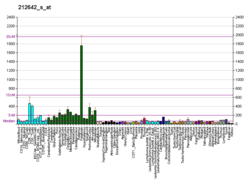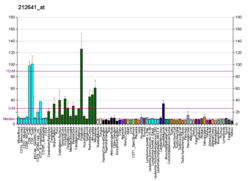HIVEP2
| HIVEP2 | |||||||
|---|---|---|---|---|---|---|---|
| Identifiers | |||||||
| Aliases | HIVEP2, HIV-EP2, MBP-2, MIBP1, SHN2, ZAS2, ZNF40B, human immunodeficiency virus type I enhancer binding protein 2, MRD43 | ||||||
| External IDs | MGI: 1338076 HomoloGene: 4900 GeneCards: HIVEP2 | ||||||
| RNA expression pattern | |||||||
  | |||||||
| More reference expression data | |||||||
| Orthologs | |||||||
| Species | Human | Mouse | |||||
| Entrez | |||||||
| Ensembl | |||||||
| UniProt | |||||||
| RefSeq (mRNA) | |||||||
| RefSeq (protein) | |||||||
| Location (UCSC) | Chr 6: 142.75 – 142.96 Mb | Chr 10: 13.97 – 14.15 Mb | |||||
| PubMed search | [1] | [2] | |||||
| Wikidata | |||||||
| |||||||
Transcription factor HIVEP2 is a protein that in humans is encoded by the HIVEP2 gene.[3][4][5]
Function
Members of the ZAS family, such as ZAS2 (HIVEP2), are large proteins that contain a ZAS domain, a modular protein structure consisting of a pair of C2H2 zinc fingers with an acidic-rich region and a serine/threonine-rich sequence. These proteins bind specific DNA sequences, including the kappa-B motif (GGGACTTTCC), in the promoters and enhancer regions of several genes and viruses, including human immunodeficiency virus (HIV). ZAS genes span more than 150 kb and contain at least 10 exons, one of which is longer than 5.5 kb (Allen and Wu, 2004).[supplied by OMIM][5]
References
- ↑ "Human PubMed Reference:".
- ↑ "Mouse PubMed Reference:".
- ↑ Sudo T, Ozawa K, Soeda EI, Nomura N, Ishii S (January 1992). "Mapping of the human gene for the human immunodeficiency virus type 1 enhancer binding protein HIV-EP2 to chromosome 6q23-q24". Genomics. 12 (1): 167–70. PMID 1733857. doi:10.1016/0888-7543(92)90423-P.
- ↑ Nomura N, Zhao MJ, Nagase T, Maekawa T, Ishizaki R, Tabata S, Ishii S (May 1991). "HIV-EP2, a new member of the gene family encoding the human immunodeficiency virus type 1 enhancer-binding protein. Comparison with HIV-EP1/PRDII-BF1/MBP-1". The Journal of Biological Chemistry. 266 (13): 8590–4. PMID 2022670.
- 1 2 "Entrez Gene: HIVEP2 human immunodeficiency virus type I enhancer binding protein 2".
Further reading
- van 't Veer LJ, Lutz PM, Isselbacher KJ, Bernards R (October 1992). "Structure and expression of major histocompatibility complex-binding protein 2, a 275-kDa zinc finger protein that binds to an enhancer of major histocompatibility complex class I genes". Proceedings of the National Academy of Sciences of the United States of America. 89 (19): 8971–5. PMC 50046
 . PMID 1409593. doi:10.1073/pnas.89.19.8971.
. PMID 1409593. doi:10.1073/pnas.89.19.8971. - Rustgi AK, Van 't Veer LJ, Bernards R (November 1990). "Two genes encode factors with NF-kappa B- and H2TF1-like DNA-binding properties". Proceedings of the National Academy of Sciences of the United States of America. 87 (22): 8707–10. PMC 55028
 . PMID 2247438. doi:10.1073/pnas.87.22.8707.
. PMID 2247438. doi:10.1073/pnas.87.22.8707. - Hillier LD, Lennon G, Becker M, Bonaldo MF, Chiapelli B, Chissoe S, Dietrich N, DuBuque T, Favello A, Gish W, Hawkins M, Hultman M, Kucaba T, Lacy M, Le M, Le N, Mardis E, Moore B, Morris M, Parsons J, Prange C, Rifkin L, Rohlfing T, Schellenberg K, Bento Soares M, Tan F, Thierry-Meg J, Trevaskis E, Underwood K, Wohldman P, Waterston R, Wilson R, Marra M (September 1996). "Generation and analysis of 280,000 human expressed sequence tags". Genome Research. 6 (9): 807–28. PMID 8889549. doi:10.1101/gr.6.9.807.
- Dörflinger U, Pscherer A, Moser M, Rümmele P, Schüle R, Buettner R (May 1999). "Activation of somatostatin receptor II expression by transcription factors MIBP1 and SEF-2 in the murine brain". Molecular and Cellular Biology. 19 (5): 3736–47. PMC 84194
 . PMID 10207097.
. PMID 10207097. - Zajac-Kaye M, Ben-Baruch N, Kastanos E, Kaye FJ, Allegra C (February 2000). "Induction of Myc-intron-binding polypeptides MIBP1 and RFX1 during retinoic acid-mediated differentiation of haemopoietic cells". The Biochemical Journal. 345 (3): 535–41. PMC 1220788
 . PMID 10642512. doi:10.1042/0264-6021:3450535.
. PMID 10642512. doi:10.1042/0264-6021:3450535. - Kimura K, Wakamatsu A, Suzuki Y, Ota T, Nishikawa T, Yamashita R, Yamamoto J, Sekine M, Tsuritani K, Wakaguri H, Ishii S, Sugiyama T, Saito K, Isono Y, Irie R, Kushida N, Yoneyama T, Otsuka R, Kanda K, Yokoi T, Kondo H, Wagatsuma M, Murakawa K, Ishida S, Ishibashi T, Takahashi-Fujii A, Tanase T, Nagai K, Kikuchi H, Nakai K, Isogai T, Sugano S (January 2006). "Diversification of transcriptional modulation: large-scale identification and characterization of putative alternative promoters of human genes". Genome Research. 16 (1): 55–65. PMC 1356129
 . PMID 16344560. doi:10.1101/gr.4039406.
. PMID 16344560. doi:10.1101/gr.4039406.
External links
- HIVEP2 protein, human at the US National Library of Medicine Medical Subject Headings (MeSH)
This article incorporates text from the United States National Library of Medicine, which is in the public domain.